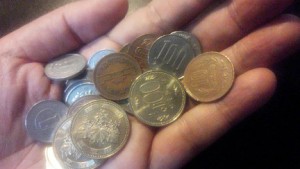In yesterday’s post I mentioned that, as part of paying off the final part of my debt, I drained the piggy bank. I also said that wasn’t a joke. Instead, it’s the result of finally paying attention to 1–something I learned when I was a kid and 2–something I saw a friend do in high school.
When I was growing up, my paternal grandparents used to put their spare change in a large mug. When we visited, my sister and I used to divvy up the contents and go on cheap toy and candy binge. There was usually about five dollars in the jar (about $22 now) and it was there every time we visited. (Along with a jar of candy my grandmother always kept full, but that’s another entry).
In high school, after we moved back to Kansas, my friend Darren appeared to have a rule where he never broke/spent a twenty dollar bill ($45 now). The result was an impressive pile of twenties at one end of his room that, if I remember correctly, he eventually spent on a new shotgun. (Remarkably, I never stole any of those twenties. Damn my Christian upbringing. Also SHOTGUN.)
Decades later, after I arrived in Japan, I found myself confronted with large handfuls of large change. Japan basically did away with it’s equivalent of the $1 and $5 dollar bills and replaced them with coins. Remembering my grandparents, I started saving my change in a jar. I also stopped spending change and instead spent notes, even if I had enough change to make the purchase. This had two results: 1–it made me think I was spending more than I was–I had seven 1,000 yen notes this morning, now I only have three. What have I done? 2–One day’s change could add up to a lot.
The other advantage of using the jar is I got to see the money grow. This was awesome and rather inspiring, but because it was coins, it was annoying to sort and carry so I never spent it. Eventually, when the jar got full, I dragged it down to the bank and deposited it, much to the annoyance of the bank. I’ve paid for vacations in Japan and plane tickets home with the change.
Note: Now, I know that many wise and financially literate people would argue that I should have cashed the change out sooner and sent it some place where I could earn interest on it. Those people are absolutely correct, except they’re overlooking the psychological importance of actually seeing the money grow. It is much more powerful than seeing the numbers in a bank account change.
The other thing I did started when, in 2,000, Japan began printing 2,000 yen notes. The public reaction was underwhelming. People in the USA have more excitement over and interest in dollar coins than the Japanese had for the 2,000 yen note. They were difficult to spend because merchants didn’t want to deal with them and no one changed out machines so that they could accept 2,000 yen notes. They therefore made a great savings source. I saved every 2,000 yen note I got and then eventually cashed them in. I did the same when Japan released new 1,000 yen notes. I saved every crisp one I found as well as every old one.
This latter idea, saving a certain kind of bill, is what I encourage my friends and family in the USA to do. Stop spending ten dollar bills. Just stick them in a jar. It’s weird at first, but you have to want to see that jar fill up.
Finally, the last thing I did, and still do to build up extra savings beyond the 20% or so of each paycheck we already save, is to be my own greedy bastard banker. Every time I take money out of my account, I charge myself an outrageous 20% ATM fee. For example, if I take out 10,000 yen, I immediately pull out 2,000 yen and put it in an envelope in my bag. As soon as I get home, I put it in my savings pouch. (Yes, I know: banks, interest, etc. In my defense, most Japanese savings accounts pay no more than .02%. That’s not 2%, that’s .02%) and exchanging into dollars costs money so it’s better to build up some cash.
If I know I’ll be spending the money on frivolous stuff, I tax myself an extra 10%. I know, I know. Some one should regulate me, so to speak.


Pingback: Cashing Change and Begging Someone Else to Do It | Mere Blather